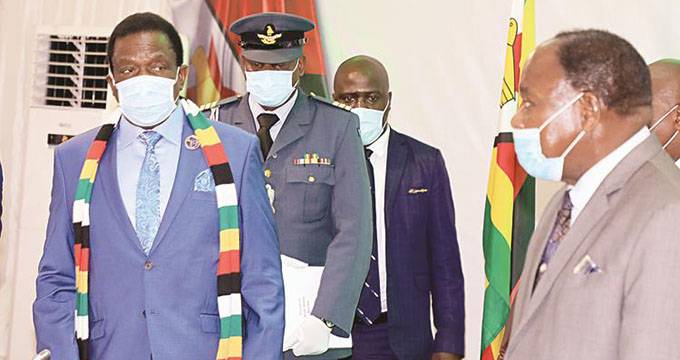Source: Govt acts on reforming parastatals | The Herald

Farirai Machivenyika Senior Reporter
A review of the ownership models of State enterprises and parastatals is underway to improve their efficiency and enhance their contribution to the attainment of targets set under Vision 2030, President Mnangagwa said yesterday when opening a seminar to review ownership models.
The review is likely to result in a major transformation in the way these enterprises are run, from the existing model where they fall under line ministries to a more centralised system.
State enterprises and parastatals are statutory bodies, such as the Grain Marketing Board, set up by an Act of Parliament and private companies, sometimes converted from statutory bodies, that are wholly or majority-owned by the State.
The half-day seminar at State House was attended by Vice President Constantino Chiwenga, Vice President Kembo Mohadi, Cabinet ministers and experts from the World Bank, African Peer Review Mechanism and the African Development Bank, among others.
“The review of the ownership model has been necessitated by the need to overhaul the corporate governance and management culture within State enterprises and parastatals in our quest to ensure their productivity, efficiency, accountability, profitability and relevance in the context of Vision 2030,” said President Mnangagwa.
Zimbabwe could learn from other countries that have transformed their State enterprises through the adoption of appropriate ownership models but President Mnangagwa emphasised that the country had to take cognisance of its realities, especially the illegal sanctions it continues to be subjected to.
The workshop was organised to enable Cabinet ministers to appreciate the aspects associated with ownership models and would be expected to make informed decisions based on achieving balance between commercial viability and the national interest.
“My Government is implementing comprehensive reforms across the socio-economic and political sectors as we accelerate the attainment of Vision 2030. The Transitional Stabilisation Programme 2018-2020 affirmed the ownership policy position with regards to State enterprises and parastatals and reinforced Government’s commitment to its implementation,” said President Mnangagwa.
He said the country had over 107 such enterprises, with most of them critical in pushing the economy forward.
“These have potential to contribute over 40 percent of the country’s GDP. Given their spread and reach, their efficient performance is crucial to the modernisation, industrialisation and development of a robust rural industry system and growth of our economy as a whole.
“We must, therefore, work concertedly to strengthen structural, governance and administrative frameworks of these entities through various strategies which include the most suitable ownership model,” he said.
President Mnangagwa added that Zimbabwe should create State enterprises and parastatals that could compete globally by attracting capital.
Addressing the media after the seminar, Finance and Economic Development Minister, Professor Mthuli Ncube, said they had discussed various ownership models.
“Of particular interest today was how State enterprises and parastatals are owned, either through line ministries or specific ministries or the Office of the President and Cabinet. We considered those issues because how the State enterprises and parastatals are owned and controlled is critical to their performance.
“You can agree with me that as of now, we have had challenges with our State enterprises and parastatals in terms of performance and how they are led, their strategies, their corporate governance issues and compliance issues all those have been issues that have been bedevilling our State enterprises and parastatals sector and as Government, we are determined in reforming our SEPs,” said Prof Ncube.
He said the experts that presented during the seminar had identified failures with the current decentralised model where the State enterprises and parastatals are controlled by line ministries.
“What they said is that the line ministries do not have adequate resources to exert oversight on these parastatals,” he added.
Some of the challenges identified include poor and inadequate skills within boards and management of State enterprises and parastatals, resulting in poor performance.
Prof Ncube said by migrating to the new model they are looking at, which is more centralised, they expect to have better control of the enterprises.
He added that a centralised ownership model will allow Government to have a clear understanding of its assets and debts and more control of its balance sheet.
Corporate governance expert and legal practitioner, Advocate Canaan Dube, who moderated the seminar, said the current position where line ministries were responsible for ownership, governance, regulation and oversight was a source of corruption and poor performance.
He said there was, therefore, need to separate the roles instead of concentrating responsibilities in one ministry.
In his closing remarks, VP Chiwenga said Cabinet will deliberate on issues that arose during the seminar.
“As we go back to our work stations and as we will meet as the Cabinet of Zimbabwe. We will thoroughly study the submissions that have been given us by the consultants, taking into account what has been said and come up with our own domesticated ownership model that will enable us to achieve our set goals.”
On adoption of the required ownership framework, a technical team led by Chief Secretary to the President and Cabinet Dr Misheck Sibanda, will be set up to craft an implementation framework.
COMMENTS
The legacy of SEPs being conduits for looting will also be re-visited to strengthen it.